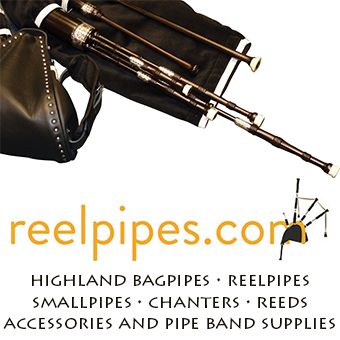By Jeannie Campbell MBE
The Book of the Club of True Highlanders was published in 1881 by subscription. The author was the Chieftain of the Club, Charles McIntyre North. He was an Anglo Scot, born about 1838. His birthplace is unknown but he grew up in the south of England. By profession he was an architect and surveyor and his drawing skills are evident in the plates incorporated in the two volumes of the book.
Volume II is the one that concerns piping as it contains a small number of ceòl mòr and ceòl beag. However, both volumes contain information about Gaelic life and culture.

In 1882 the Scottish Gathering had been arranged for Whit Monday at the Stamford Bridge Ground, Fulham. There would be competitions in pipe music, dancing and athletics with prizes to the value of £150. The Gathering took place on Monday, May 29 in fine weather and in the presence of the Duke and Duchess of Atholl and many other noblemen and gentlemen. In the piobaireachd competition the result was: 1. William Shearer, 2. Angus MacRae, 3. William MacLennan. For the March, Strathspey and Reel: 1. Robert Meldrum, 2. J. MacKenzie, 3. William MacLennan. One report said an A. L. Reith won several handsome prizes, so presumably this was in the amateur piping or dancing.
Angus MacRae (1855-1934) had many appointments as a piper in private service, including 1904-1911 as piper to the Duke of Atholl. His last appointment was with the Earl of Dudley in London. He won the Prize Pipe in 1879 at the Northern Meeting and the Clasp in 1898. At the Argyllshire Gathering he won the Gold Medal in 1883.
Robert Meldrum (1851-1941) enlisted in the 78th in 1868 and in 1870 became Pipe Major 93rd Highlanders. He won the Prize Pipe at the Northern Meeting in 1884 and the Clasp in 1902. At the Argyllshire Gathering he won the Gold Medal in 1886. In later years he was employed by Lord Willoughby d’Eresby Earl of Ancaster at Drummond Castle for 23 years and Instructor Queen Victoria School 1918-1923.
The 1883 Gathering took place at Stamford Bridge on Whit Monday, May 14. Despite the day being overcast, with continuous drizzling rain there was a good attendance, including the Duchess of Atholl and a long list of others. The judges were Sir Duncan Campbell of Barcaldine, Major the Hon J. Scott Napier, Major Colin MacKenzie, J. Guthrie Lornie of Birnam, Hugh M. Cumming, Thomas Houghton, H. E. MacLeod, William Waddell and John MacKay.

The regulations stated that the objects of the gathering were “to afford the Scottish residents in London, and their friends, an opportunity of meeting once a year in the open air to uphold the wearing of the wearing of the Highland dress, to encourage such manly and healthy sports as have been characteristic of the Scottish youth from time immemorial and to aid the Scottish charities.” The London Scottish was present in force, the boy drummers and pipers of the Royal Caledonian Asylum played at intervals during the day and the band of The Black Watch was also present. Two of the Asylum boys, Master Newcater only ten years of age, and Master Gunn, 12 years of age, added considerably to the enjoyment of the spectators by the admirable way in which they danced the Ghillie Callum. At the end of the proceedings Lady Lovat presented the prizes.
The results were:

Piobaireachd – 1. John MacColl, Dunach; 2. Angus MacRae, Raasay; 3. Norman MacLeod, Black Watch and Henry Fraser, Scots Guards.
Marches, Strathspeys and Reels – 1. John MacKenzie, Pentonville; 2. William Stark, Black Watch; 3. Henry Fraser, Scots Guards.
Amateurs
Marches – 1. A. L. Reith, London Scottish; 2. David A Reid, Norwich.
Strathspeys and Reels – 1. A. L. Reith.
Dancing
Highland Fling – 1. John MacColl, Dunach; 2. John McNeill, Edinburgh; 3. James Tarber. Ghillie Callum – 1. John MacColl, Dunach; 2. John McNeill, Edinburgh, 3. F. Crichton, Edinburgh.
Strathspey and Reel – 1. John McNeill, 2. David Dow, Abercairney; 3. James Forbes.
John MacColl (1860-1943) spent two years in Glasgow with Donald MacPhee before becoming Piper to MacDonald of Dunach in 1881. By 1891 John was able to support himself by competing in piping, dancing and athletics, with some teaching during the winter months when he was employed by the army to teach the Territorial Army pipers. In 1908 he returned to Glasgow where he became the manager of R. G. Lawrie’s bagpipe shop. He won the Gold Medal at the Northern Meeting in 1883 and the Clasp in 1884, 1888 and 1900. At the Argyllshire Gathering he won the Gold Medal in 1881.
Henry Fraser served with the Scots Guards from 1882 and was Pipe Major of the 1st Battalion from 1890-1899, the 2nd Battalion from 1899-1900 and the 3rd Battalion from 1900-1903 when he became Pipe Major Lovat Scouts and piper to Lord Lovat.
Norman McLeod was Pipe Major of The Black Watch from 1882-83 but was demoted. He was originally in the 78th. Norman was born in Argyll, but his father John Colin McLeod was from Kilmuir, Skye.
William Stark was born in the Gorbals area of Glasgow and died at Harthill in Lanarkshire. He was Pipe Major of the 2nd Battalion Black Watch in 1883-86, and was originally from the 72nd.
• Part 1
• Part 2
• Part 3
• Part 4
• Part 5
• Part 6
• Part 7
• Part 8


